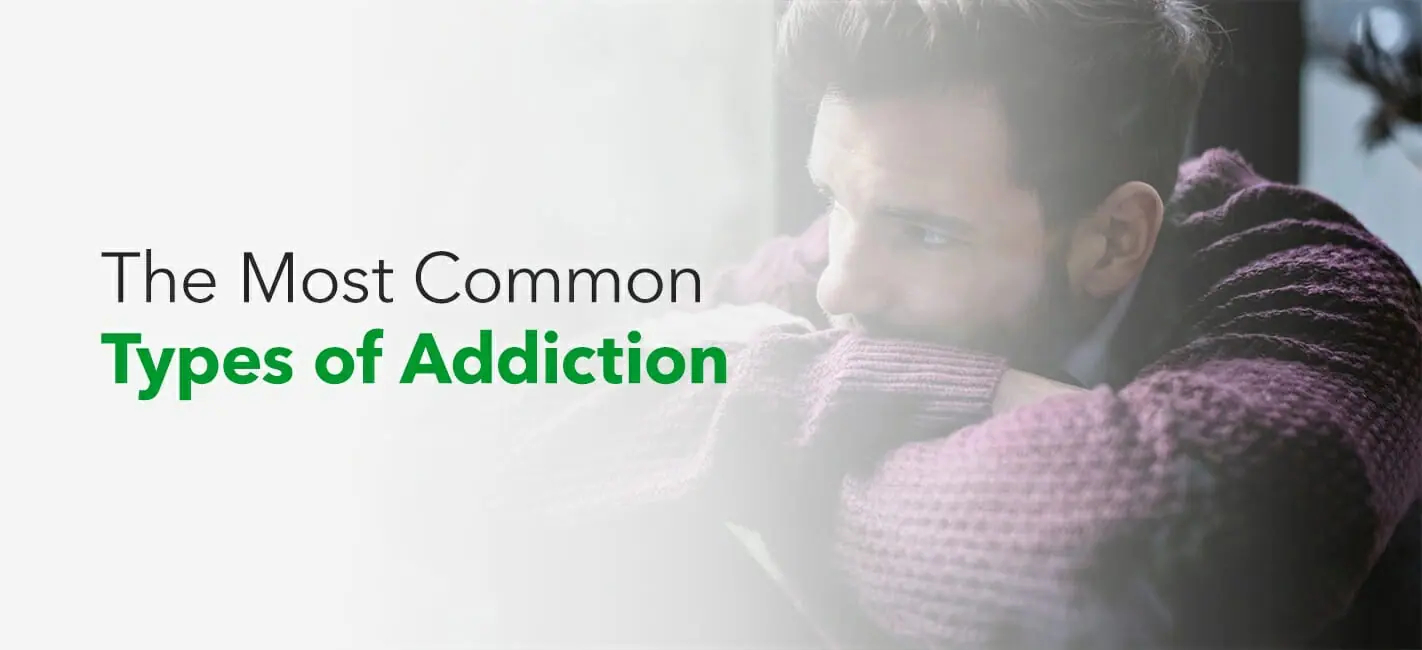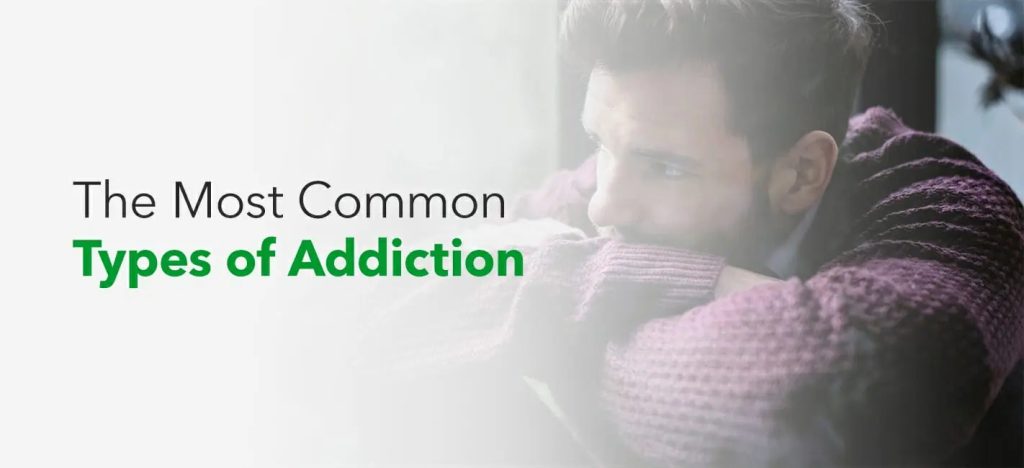
What is addiction? The answer to this question is more complex than you might expect. On the surface, addiction means someone repeatedly participates in behavior that has negative and often unhealthy consequences. When you look closer, it becomes clear that the cycle of addiction is caused by dysfunction in the brain, linked to genetic and environmental factors.
The brain creates a compulsive craving for a specific substance or behavior, and you find yourself stuck in the cycle of seeking the reward that follows indulging that addiction, regardless of the outcome.
Addiction is a disease that can come in many forms. What are the most common types of addiction? We will explore them below in-depth.
Types of Addiction
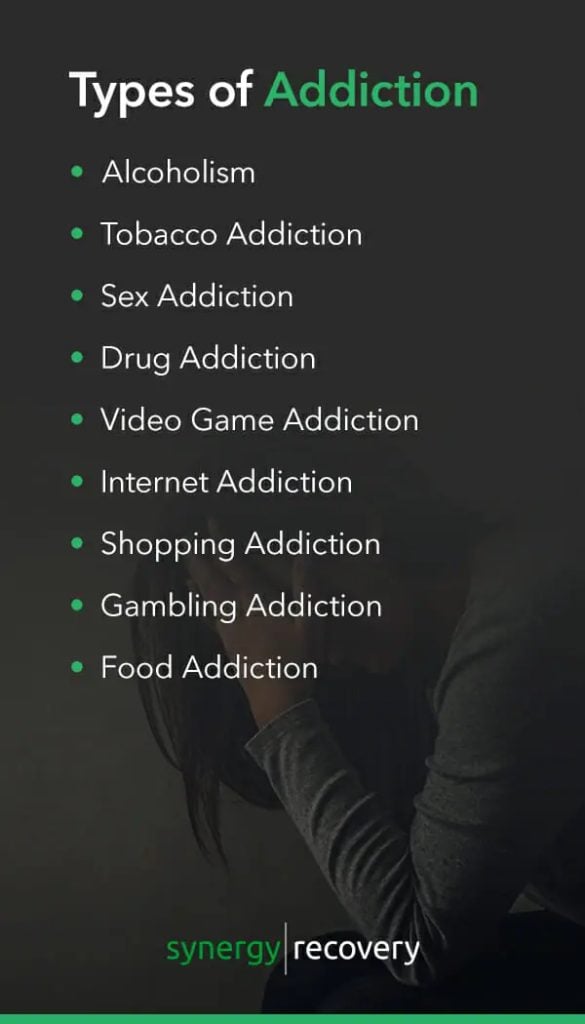
Many addictions can fit within three categories, which include the following:
- Behavioral addiction: Many people associate addiction solely with substances, like alcohol or drugs. But you can also be addicted to specific behaviors. Common addictive behaviors include shopping, sex, gambling and video gaming. The compulsive behavior gives the user a rush or high similar to what those addicted to a substance experience.
- Substance addiction: Substance addiction creates a physical dependence on a specific chemical. People can be addicted to prescription medication, such as opioids, or illicit drugs, such as crystal meth, heroin or cocaine. Alcoholism is also considered a type of substance addiction.
- Impulse addiction: Impulse control disorders can lead to impulse addiction. Someone with an impulse control disorder struggles to manage their emotions and actions. This disorder may make someone prone to theft, emotional outbursts or destructive behavior. Approximately 10.5% of people have an impulse control disorder, according to the fourth edition of the Diagnostic and Statistical Manual of Mental Disorders. Behaviors that arise with impulse control disorders can become addictive. Impulse addiction can also intersect with other mental health issues, such as substance abuse.
Specific types of addiction disorders include the following.
Alcoholism
Alcoholism is a common addiction, with more than 14 million U.S. adults struggling with an alcohol use disorder. Recognizing alcohol addiction can be more difficult than other substance use disorders. Alcohol is legal for adults over the age of 21, and binge drinking is normalized in many groups and social settings. While it is possible to responsibly consume and enjoy alcohol, addiction can have serious consequences.
Heavy alcohol usage has a well-documented connection to cognitive impairment and health issues, such as liver disease. Abuse of this substance can also lead to alcohol poisoning, which is potentially fatal.
Tobacco Addiction
Tobacco is well-known as an addictive substance. Whether it’s cigarettes or chewing tobacco, this substance contains nicotine. Most tobacco users begin at a young age — nine out of 10 smokers pick up the habit before they turn 18 — and it can be a difficult addiction to break. Nicotine causes an increase in adrenaline and dopamine, facilitating a pleasurable sensation while smoking. However, the health consequences of smoking are severe.
Tobacco use is a leading cause of preventable deaths. Millions of people die every year due to tobacco use. While the dangers of tobacco use are common knowledge, users often struggle with withdrawal symptoms, both physical and mental, when they try to quit.
Sex Addiction
Sex is a healthy part of many people’s lives, but it can become a behavioral addiction. This addiction is characterized by compulsive sexual behavior. For some people, this means excessive consumption of pornography or masturbation. For others, sex addition means engaging in sexual behavior with partners. However the addiction is expressed, it typically comes at the expense of your relationships — and potentially your health.
The fifth edition of the Diagnostic and Statistical Manual of Mental Disorders excludes sex addiction, making it somewhat controversial. But this dependency is still regularly discussed. An inability to control sexual thoughts and behaviors could indicate that discussion of addiction is warranted.
Drug Addiction
Drugs are usually one of the first things people think of when talking about addiction. People can become addicted to a wide variety of drugs, and the cycle of addiction can be difficult to break. Using substances like cocaine, heroin and methamphetamines can easily lead to addiction. Drug addicts exhibit compulsive drug-seeking behavior and struggle to balance their addiction with the rest of their lives.
Drug addiction can cause health problems, difficulty at school or work, financial issues and deterioration of relationships with friends, family and colleagues. While drug addiction often carries a stigma, it is important to understand there are various contributing factors. Addiction is a disease that can be caused by a combination of genetic, environmental and developmental factors.
Video Game Addiction
Video gaming is a common behavioral addiction. While this activity can be a fun way to unwind or spend time with friends, it can develop into an unhealthy dependence. A video game addict will prioritize gaming over their relationships and other activities. This addiction, like many others, can interfere with responsibilities like education and work. It can also cause financial issues. Some people will continue to buy games or upgrade their gaming experience, despite not having the money to do so.
Video game addiction can be more difficult to recognize and seek help for because it does not have as many obvious consequences. It is not physically addictive or harmful like alcohol or drugs, but the repercussions are still very real.
Internet Addiction
The internet is a practically ubiquitous tool. We use it for school, work and relaxation. With smartphones, tablets and computers, the internet is almost always just a tap or click away. In many ways, this has made life easier. We can find the answer to nearly any question almost immediately. We can connect with friends and family across the world.
On the other hand, the internet and its accompanying screentime have their downsides. Many of us find ourselves mindlessly scrolling through our social media feeds for hours. Though not yet officially recognized by the Diagnostic and Statistical Manual of Mental Disorders, research does indicate that internet addiction is a prevalent issue.
Addiction to video gaming and online gambling can fall under the umbrella of internet addiction.
Shopping Addiction
“Retail therapy” is a common phrase. If you are feeling down, you go out to buy something new. That is a pretty harmless outlet for negative feelings if you indulge in it occasionally. But shopping, like any behavior, can evolve to become compulsive. Approximately 18 million Americans have a shopping addiction. The negative consequences of this dependence are largely financial.
Some people who are addicted to shopping may stretch or break their budgets to feed their habit. They continue to buy, despite not needing or even wanting more items. This may lead to maxing out and opening new credit cards. As the financial burden mounts, a shopping addict may also have to contend with a negative impact on their relationships, particularly if they share finances with a partner or spouse.
Gambling Addiction
Behavioral addictions like gambling also have negative financial consequences. Compulsive gambling, like other addictions, is driven by the feeling of reward you get when you place bets. No matter how many losses you experience, the compulsion drives you to continue. Gambling addicts can exhaust their savings, destroy relationships and even steal to continue fueling their behavior.
Like other addictions, the tolerance level can increase over time. You may find yourself needing to make larger bets more frequently to achieve the same feeling. Some people may focus on just one game, such as online poker, while others may find multiple outlets appealing, such as casino table games, slots and online betting forums.
Food Addiction
Food addiction can come with serious physical and psychological effects. Someone struggling with food addiction may also be contending with obesity, chronic pain, anxiety symptoms and depression. This addiction may be a way of coping with difficult emotions, such as stress. Food, particularly food high in fat, sugar and salt, can trigger the brain’s reward system. You may find yourself compulsively eating even if you’re not hungry.
While food addiction can involve eating many different things, some foods are considered triggers for this dependency. Items such as ice cream, candy, pasta and chips are often associated with compulsive eating.
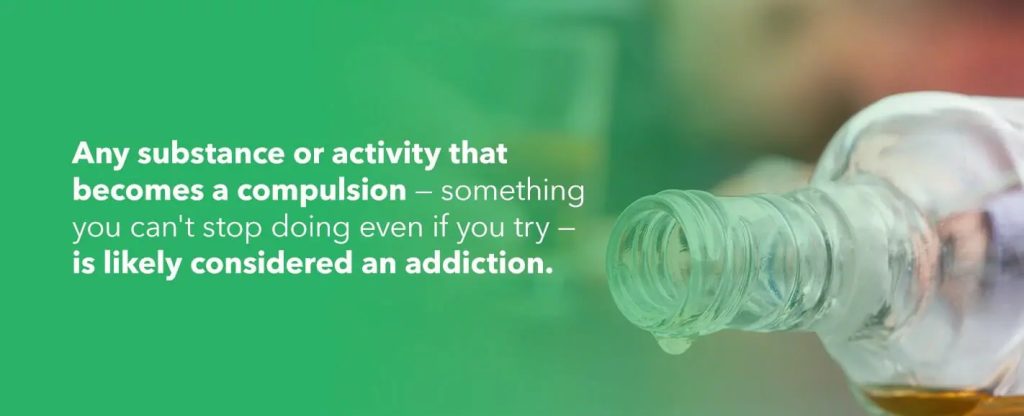
How to Identify an Addiction
Many pleasurable activities can become addictions, but how do you recognize that shift from enjoyable pastime to dependency? Some common signs of addiction include:
- Priority shift: Are other aspects of your life, such as work, school or socialization, becoming less important than taking that drug, having a drink, swiping your credit card or gaming?
- Lack of control: Do you find yourself returning to the same behavior even though you recognize it is a problem?
- Increased tolerance: Do you need to take more of a drug or drink more to get the same feeling you are chasing? Do you need to shop, bet, eat or play more?
- Increased risk-taking behavior: Are you less concerned with risks and consequences than with achieving that pleasurable feeling? Addicts often risk their health, safety, relationships and financial security to maintain their addiction.
- Withdrawal: Do you feel unpleasant physical or psychological symptoms if you are unable to indulge in your substance or activity of choice?
How Do Habits Become an Addiction?
A habit is something we are accustomed to doing. Maybe you have a glass of wine or a beer after a particularly stressful day at work. That is a common habit for many people. But what if that habit becomes a daily activity? What if a drink is the only answer you have to cope with stress? You are likely crossing the line from habit to addiction. It is best to acknowledge and seek help for this issue as soon as possible to avoid forming an addiction that’ll become difficult to break.
Any substance or activity that becomes a compulsion — something you can’t stop doing even if you try — is likely considered an addiction.
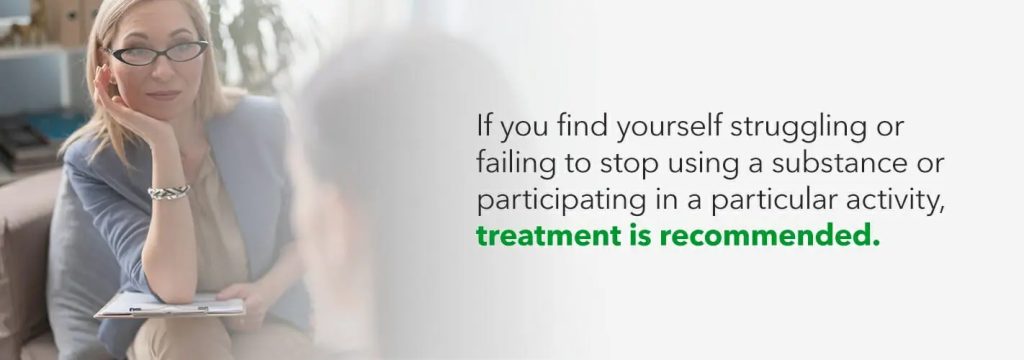
When Do Addictions Need to Be Treated?
Addiction is a complex condition caused by multiple factors. In some cases, people can recognize their addiction and break the cycle on their own. In most cases, people need help. There are trained treatment providers out there who can help you get your addiction under control so it no longer harms you.
If your addiction is negatively affecting your quality of life, you need treatment. Whether the negative consequences are physical, emotional, social, financial or any combination of those, addiction treatment can help you move forward. Treatment may be temporary, or it may be a lifelong process. If you find yourself struggling or failing to stop using a substance or participating in a particular activity, treatment is recommended.
How to Treat Addictions
Addiction treatment will vary depending on the substance or activity and each individual’s experience. Addiction can sometimes go hand-in-hand with a personality disorder or other mental health issue, requiring a multifaceted approach to treatment. Some addictions can be treated through an outpatient program, while others may require residential treatment or hospitalization. Recovery will differ depending on the individual and type of addiction.
Behavioral Addiction
Treatment of behavioral addictions, like gambling, eating, shopping and sex, can be approached in several different ways. Some people will find it helpful to attend support groups, which offer the opportunity to talk to individuals who are going through a similar experience. Cognitive behavioral therapy can help you recognize and change harmful behavioral patterns. Like we do here at Synergy Recovery, medication may also be used to combat withdrawals and relapse.
Substance Addiction
Treating substance addiction, whether that substance is alcohol or a drug, often requires medical supervision. Suddenly ceasing drug or alcohol use can be dangerous and potentially deadly. You may need to participate in an inpatient program, such as our Intensive Outpatient Program, or a partial hospitalization recovery program during the initial recovery phase.
After that, treatment will likely be a combination of therapy — one-on-one or group — and medication. Treatment must continue for a long enough period to help addicts avoid and handle potential relapses. The exact treatment approach will differ for everyone.
Impulse Addiction
Impulse control disorders often overlap with different kinds of addictions. For example, approximately 22% to 50% of people with kleptomania — compulsive theft — also have a substance abuse disorder. With many different factors in play, intervention and treatment will need to be carefully planned.
Treatment will likely be integrated, meaning it addresses the entire issue rather than each condition separately. Integrated therapy can combine medication, cognitive behavioral therapy and counseling. Therapy may also be recommended for the people close to you. Couples or family therapy can be a helpful addition.
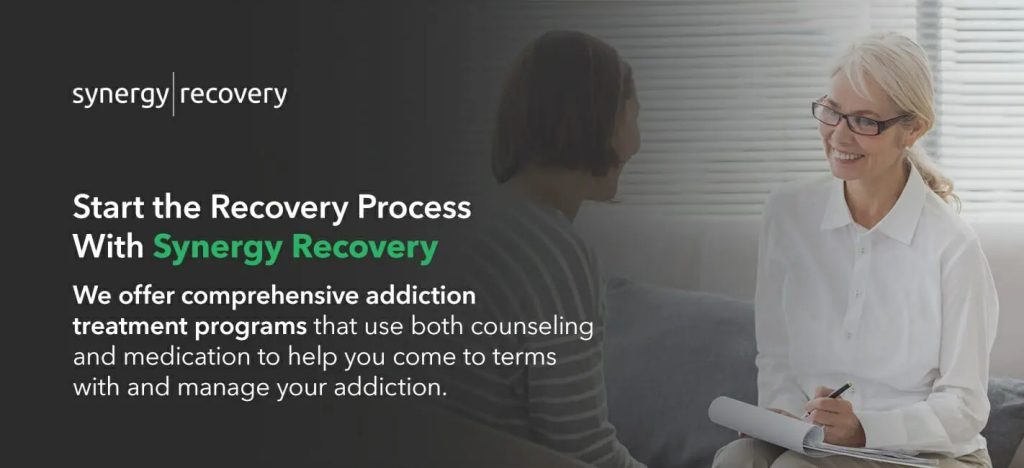
Start the Recovery Process
At Synergy Recovery, we focus on your recovery by providing a customized treatment plan. We offer comprehensive addiction treatment programs that use both counseling and medication to help you come to terms with and manage your addiction. Everyone’s story is different, and we tailor our treatment to you. If you recognize you need help, you have already made a huge step toward recovery. Contact us today to book an appointment and begin moving forward with your recovery and your life.


